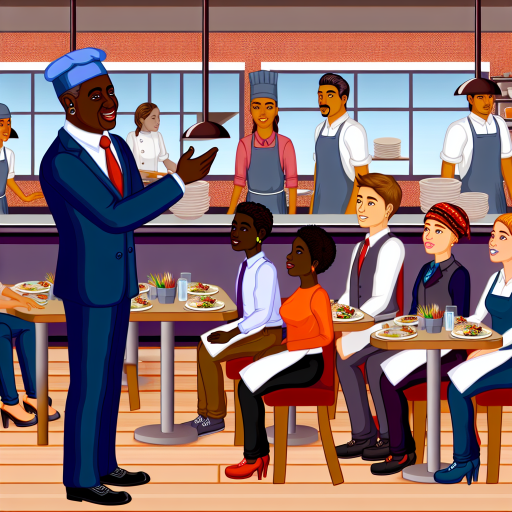Quality Control in the Restaurant Industry
Quality control is essential in the restaurant industry for maintaining customer satisfaction and loyalty.
Restaurant managers play a crucial role in ensuring high standards are met and maintained consistently.
Restaurant Managers’ Responsibilities in Quality Control
- Setting and monitoring quality standards: Restaurant managers are responsible for establishing quality control procedures and ensuring they are followed by staff.
- Training and supervision: Managers train staff on proper food handling, preparation, and service to maintain quality standards.
- Managing inventory: Managers oversee inventory management to ensure freshness and quality of ingredients used in food preparation.
- Inspecting food quality: Managers regularly inspect food during preparation, cooking, and serving to ensure it meets quality standards.
- Handling customer complaints: Managers address customer complaints promptly and implement corrective actions to prevent future issues.
- Monitoring cleanliness and hygiene: Managers ensure the restaurant meets sanitation standards to uphold quality and prevent foodborne illnesses.
- Implementing quality improvement initiatives: Managers identify areas for improvement and collaborate with staff to implement changes for better quality control.
- Collaborating with suppliers: Managers work closely with suppliers to ensure the quality of ingredients and products used in the restaurant.
- Conducting regular reviews and audits: Managers conduct regular reviews and audits to assess quality control practices and make necessary adjustments.
- Ensuring compliance with regulations: Managers ensure the restaurant complies with health and safety regulations to maintain quality control standards.
The role of a restaurant manager in quality control is indispensable for delivering high-quality food and service to customers.
Their attention to detail, leadership, and commitment to excellence play a vital role in the success of the restaurant.
Setting quality standards:
Setting quality standards is crucial for maintaining consistency and meeting customer expectations.
Restaurant managers are responsible for establishing and enforcing these standards throughout the operation.
Managers train staff on quality standards to ensure they understand and adhere to procedures effectively.
Importance of setting quality standards in a restaurant:
Quality standards help ensure that the food, service, and overall experience meet customer expectations.
Consistency in quality helps build a positive reputation and encourages repeat business.
Setting standards also ensures compliance with health and safety regulations, promoting a safe environment for both customers and employees.
Role of restaurant managers in developing and implementing standards:
Managers are responsible for assessing current practices and identifying areas for improvement.
They collaborate with the kitchen staff, servers, and other team members to establish clear quality guidelines.
Managers oversee the implementation of these standards and monitor performance to ensure consistency.
Manager’s role in training staff on quality standards:
Managers conduct training sessions to educate employees on the importance of quality standards.
They provide hands-on demonstrations and guidance to help staff understand and follow procedures accurately.
Ongoing training and feedback from managers help employees maintain consistent quality in their work.
Monitoring Food Safety:
Food safety is paramount in maintaining quality in a restaurant.
It ensures that customers are protected from foodborne illnesses.
Additionally, it ensures that the restaurant’s reputation remains untarnished.
-
Importance of food safety:
Food safety is crucial as it directly affects the health and well-being of customers.
Ensuring safe food practices is a fundamental responsibility for restaurant managers.
-
Role of restaurant managers:
Restaurant managers play a critical role in overseeing food safety practices within the establishment.
They are responsible for creating and implementing protocols that ensure food safety standards are upheld at all times.
-
Ensuring compliance with regulations:
Managers must ensure that the restaurant complies with all food safety regulations set forth by local health authorities.
This involves regular inspections, training staff on proper food handling techniques, and maintaining accurate records.
By actively monitoring food safety, restaurant managers can prevent foodborne illnesses.
Transform Your Career Today
Unlock a personalized career strategy that drives real results. Get tailored advice and a roadmap designed just for you.
Start NowThey can maintain customer trust and uphold the reputation of the establishment.
Uncover the Details: How to Maintain Professionalism as a Casino Dealer
Managing inventory in a restaurant is crucial for maintaining quality control and overall efficiency.
Let’s delve into how inventory management plays a significant role in ensuring the success of a restaurant:
Contribution to Quality Control
- Effective inventory management ensures that all ingredients and supplies are fresh and of high quality.
- By tracking inventory levels, restaurant managers can prevent wastage of perishable items.
- Having accurate inventory data helps in menu planning and maintaining consistency in dishes.
Role of Restaurant Managers
- Restaurant managers are responsible for monitoring inventory levels regularly to avoid stockouts or overstocking.
- They oversee the ordering process to ensure that the right ingredients are purchased in the right quantities.
- Managers conduct regular checks on the quality of ingredients received from suppliers to maintain standards.
Identifying and Addressing Issues
- Managers play a key role in identifying any discrepancies in inventory counts and taking corrective actions.
- They investigate any inconsistencies in ingredient quality and work on resolving these issues promptly.
- Addressing inventory issues promptly helps in maintaining customer satisfaction and preventing waste.
Effective inventory management is crucial for ensuring quality control in a restaurant.
Restaurant managers play a vital role in monitoring inventory levels, ensuring ingredient quality, and addressing any issues that may arise.
By taking proactive measures in managing inventory, restaurants can streamline operations, reduce costs, and deliver consistent quality to customers.
Explore Further: Empowering Careers in Las Vegas: Wright’s Resumes and Connections Insights
Customer Service
Customer service is a crucial aspect of quality control in a restaurant.
It directly impacts the overall dining experience and customer satisfaction.
Here is how restaurant managers play a vital role in ensuring excellent customer service.
Training Staff
- Restaurant managers are responsible for training staff to provide excellent customer service.
- They set the standards for how customers should be greeted, served, and attended to during their dining experience.
- Managers conduct training sessions to teach employees how to handle customer inquiries, take orders accurately, and resolve issues promptly.
Handling Customer Complaints
- Managers play a critical role in addressing customer complaints and feedback in a timely and professional manner.
- They listen to customers’ concerns, empathize with their experience, and work towards finding a satisfactory solution.
- Managers need to remain calm under pressure and ensure that the customer feels heard and valued.
Maintaining Quality Standards
- By handling customer complaints effectively, managers help maintain and even enhance the restaurant’s quality standards.
- Feedback from customers provides valuable insights into areas that need improvement, such as food quality, service speed, or cleanliness.
- Managers implement changes based on customer feedback to ensure that quality standards are consistently met and exceeded.
Customer service is a key component of quality control in a restaurant.
Restaurant managers play a pivotal role in ensuring that customers have a positive and satisfying dining experience.
See Related Content: Essential Tools for Modern Real Estate Agents
Supervising staff:
Having well-trained and motivated staff is crucial for maintaining quality control.
Restaurant managers play a key role in supervising and evaluating staff performance.
Managers provide feedback and support to staff to help them improve the quality of service.
Ensuring that the staff in a restaurant are well-trained and motivated is essential for maintaining high standards of quality control.
Well-trained staff are more likely to understand and adhere to the restaurant’s quality standards, resulting in consistent and high-quality service for customers.
Restaurant managers are responsible for supervising and evaluating staff performance to ensure that all employees are meeting expectations.
Transform Your Career Today
Unlock a personalized career strategy that drives real results. Get tailored advice and a roadmap designed just for you.
Start NowBy monitoring their performance, managers can identify areas where staff may need additional training or support to improve their skills and meet quality standards.
Managers also play a crucial role in providing feedback and support to staff.
This includes recognizing good performance and providing constructive criticism when necessary.
By offering feedback and support, managers can help employees understand what is expected of them and how they can improve their performance to deliver better service to customers.
The role of restaurant managers in supervising staff is vital for maintaining quality control in a restaurant.
By ensuring that staff are well-trained, motivated, and supported, managers can help create a positive work environment.
Employees are empowered to deliver the highest levels of service to customers.
Gain More Insights: Preparing for a Casino Dealer Audition: Tips and Tricks

Implementing quality control systems:
– Different quality control systems that can be implemented in a restaurant:
- Food safety management systems like HACCP (Hazard Analysis and Critical Control Points).
- Quality management systems such as ISO 9001 to ensure consistent product quality.
- Cleaning and sanitation protocols to maintain a hygienic environment.
– Restaurant managers oversee the implementation of these systems:
- Assigning responsibilities to staff for maintaining quality standards.
- Providing training on proper procedures and protocols.
- Conducting regular inspections and audits to ensure compliance.
– Role of managers in continuously monitoring and improving quality control processes:
- Collecting feedback from customers and identifying areas for improvement.
- Analyzing data to identify trends and patterns in quality issues.
- Implementing corrective actions and making necessary adjustments to improve quality.
Ensuring Cleanliness and Sanitation
One of the most critical aspects of maintaining quality standards in a restaurant is ensuring cleanliness and sanitation.
This is crucial not only for the health and safety of customers but also for the overall reputation of the establishment.
Importance of Cleanliness and Sanitation
- Prevents foodborne illnesses
- Maintains a positive reputation
- Complies with health regulations
- Creates a pleasant dining environment
Restaurant managers play a pivotal role in enforcing cleanliness and sanitation protocols to uphold these standards.
They must lead by example and ensure that all staff members adhere to proper hygiene practices.
Enforcing Cleanliness and Sanitation Protocols
Managers are responsible for setting the tone when it comes to cleanliness and sanitation.
They must establish clear expectations for staff members and provide training on proper hygiene practices.
Regular inspections and audits are key to ensuring compliance with cleanliness and sanitation protocols.
Managers should conduct thorough checks of the kitchen, dining areas, and restrooms to identify any potential issues.
Role of Managers in Conducting Regular Inspections
- Identify areas that need improvement
- Address issues promptly
- Provide feedback and guidance to staff
- Implement corrective actions as necessary
Managers must lead by example and demonstrate the importance of cleanliness and sanitation to all staff members.
Transform Your Career Today
Unlock a personalized career strategy that drives real results. Get tailored advice and a roadmap designed just for you.
Start NowBy enforcing strict protocols and conducting regular inspections, they can ensure that the restaurant maintains high-quality standards at all times.
Continuous Improvement of Quality
Continuous improvement is crucial in maintaining high-quality standards in a restaurant.
It involves constantly seeking ways to enhance processes and outcomes to satisfy customers and stay competitive in the market.
Restaurant managers are at the forefront of this effort, as they are responsible for overseeing operations and ensuring that quality is consistent across all areas of the establishment.
The Importance of Continuous Improvement
- Improves customer satisfaction
- Enhances brand reputation
- Increases operational efficiency
- Drives long-term success
Identifying Areas for Improvement
Managers play a key role in identifying areas within the restaurant that need improvement.
This can involve analyzing customer feedback, tracking performance metrics, and conducting regular evaluations of processes and procedures.
By monitoring various aspects of the restaurant, such as food quality, service speed, and cleanliness, managers can pinpoint areas that require attention and implement targeted strategies for improvement.
Implementing Changes and Measuring Impact
- Develop action plans
- Allocate resources effectively
- Train staff on new procedures
- Monitor performance metrics
Managers are responsible for implementing changes to address identified areas for improvement.
This may involve developing action plans, allocating resources effectively, and training staff on new procedures or practices.
By closely monitoring performance metrics, managers can measure the impact of these changes on quality and make adjustments as needed to ensure continuous improvement.
Restaurant Managers and Quality Control
Restaurant managers play a crucial role in quality control.
They oversee various aspects of the dining experience.
Staff Training
Managers train staff to ensure they understand food preparation.
They also emphasize proper service procedures.
Menu Consistency
They work to maintain consistency in food quality.
Portion sizes and presentation across all dishes is essential.
Customer Feedback
Managers gather and analyze customer feedback regularly.
This helps identify areas for improvement in service.
Quality Standards
They set and enforce quality standards effectively.
These standards meet or exceed industry regulations.
Transform Your Career Today
Unlock a personalized career strategy that drives real results. Get tailored advice and a roadmap designed just for you.
Start NowSafety and Cleanliness
Managers ensure the restaurant meets hygiene standards.
This helps prevent foodborne illnesses and maintain cleanliness.
Supplier Relationships
They work with suppliers to source high-quality ingredients.
These ingredients are crucial for the restaurant’s dishes.
Monitor Operations
Managers regularly monitor kitchen operations and dining room activities.
This helps address any issues affecting quality promptly.
Importance of Restaurant Managers
Restaurant managers play a vital role in ensuring high-quality experiences.
They work hard in quality control, staff training, and menu consistency.
Analyzing customer feedback and setting quality standards is also essential.
They maintain safety and cleanliness within the establishment.
Furthermore, managing supplier relationships is critical.
Effective monitoring of operations contributes to overall success.
Appreciating their dedication ensures exceptional service and great food.
Additional Resources
The Four Functions of Management: How They Impact Business …
Restaurant Industry Job Descriptions | National Restaurant …
[E-Books for Sale]
The Big Book of 500 High-Paying Jobs in America: Unlock Your Earning Potential
$19.99 • 500 High-Paying Jobs • 330 pages
Explore 500 high-paying jobs in America and learn how to boost your career, earn more, and achieve success!
See All 500 High-Paying Jobs of this E-Book
1001 Professions Without a Degree: High-Paying American Jobs You Can Start Now
$19.99 • 1001 Professions Without a Degree • 174 pages
Discover 1001 high-paying jobs without a degree! Unlock career tips, skills, and success strategies for just $19.99!




